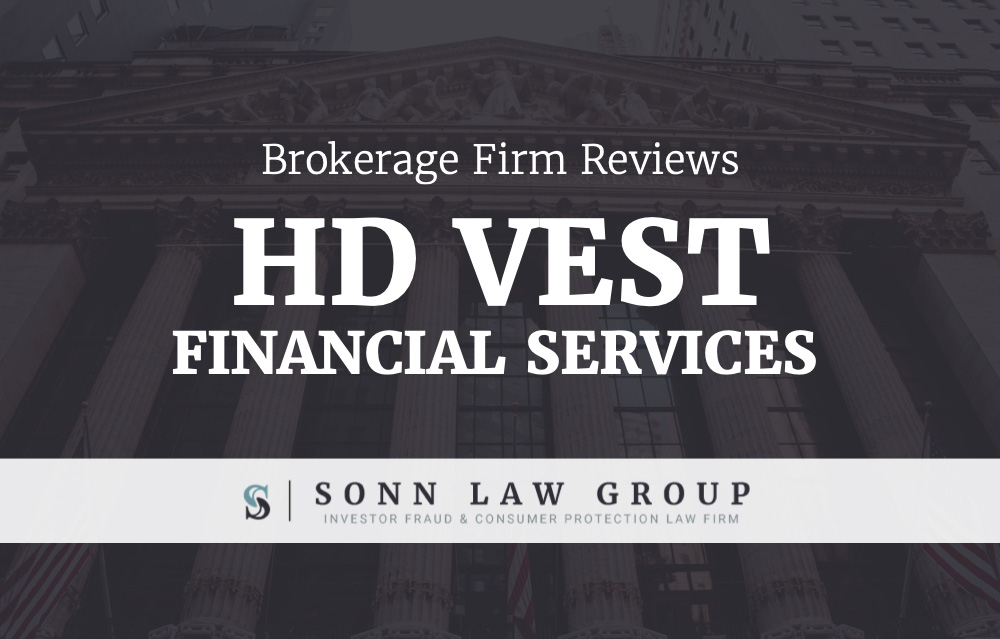What current and prospective clients should know about complaints and regulatory actions against HD Vest Financial Services
 At Sonn Law Group, our experienced investment fraud lawyers are currently investigating complaints against HD Vest (CRD#: 13686).
At Sonn Law Group, our experienced investment fraud lawyers are currently investigating complaints against HD Vest (CRD#: 13686).
This brokerage firm is headquartered in Irving, Texas, and employs securities representatives operating in all 50 U.S. states and several territories.
H.D. Vest is regulated by the Financial Industry Regulatory Authority (FINRA) and the SEC.
If you are considering becoming a client of HD Vest Financial Services – or you are currently a client – it’s important that you know about the customer complaints and regulatory actions against the firm.
Below you’ll find information about notable customer disputes and regulatory actions involving HD Vest, in addition to a running list of links to news stories involving brokers and advisors at the Firm.
Can I Sue My HD Vest Financial Advisor?
The answer is: Yes, you can sue your HD Vest financial advisor. You can file an arbitration claim to seek financial compensation when an advisor – or the brokerage firm they work for – fails to abide by FINRA’s rules and regulations and you suffer investment losses as a result.Investment losses? Let’s talk.
844-689-5754Or, contact us online.
Browse HD Vest Financial Complaint and Regulatory Action News
- Former HD Investment Services Broker Erin Verespy Barred for Misappropriated Client Funds (5/17/2019)
- Broker Investigation: Jerry Davis Raines and Donna Lynn Barnard (9/11/2018)
- Broker Investigation: Jerry Raines, former H.D. Vest broker (8/7/2018)
- SEC Charges H.D. Vest Investment Services With Supervisory Failures Related to Registered Reps’ Outside Business Activities (3/6/2015)
- FINRA Bars Richard Allan Danz, St. Marys, Pennsylvania, from Securities Industry Following Misappropriation of Client Funds (11/2/2013)
HD Vest: Notable Regulatory Actions
Improper Application of Front-End Sales Discounts
In November of 2016, FINRA’s Department of Enforcement charged H.D. Vest with disadvantaging certain retirement plans and charity-based clients. Under securities industry rules and regulations, these types of customers are eligible for front-end sales charge discounts on certain transactions.
Registered brokerage firms have a professional duty to properly identify and apply these discounts, along with any other available discounts. Unfortunately, H.D. Vest failed to live up to this basic obligation.
As a result, several of the firm’s clients were significantly overcharged. Without admitting to or denying the allegations that it failed to properly apply front-end sales discounts, H.D. Vest agreed to pay $261,905 in monetary disgorgement and financial restitution.
Failure to Supervise Securities Representatives: Misappropriation of Funds
Under FINRA Rule 2150, individual brokers are legally prohibited from engaging in any misuse of their client’s securities or investment funds. Brokerage firms, such as H.D. Vest, have a professional obligation to supervise their securities representatives, taking all reasonable steps to ensure that this type of serious misconduct never takes places.
Unfortunately, in March of 2015, FINRA investigators found that H.D. Vest failed to meet this basic standard of care. According to the Securities and Exchange Commission (SEC), an H.D. Vest securities representative participated in a fraud scheme, misappropriating nearly $300,000 from one of the firm’s clients.
SEC officials determined that the broker made false and misleading statements to customers and fabricated documents in order to perpetuate and cover up the fraud. This broker was, in fact, diverting client money to pay for his personal expenses and side business interests. Certainly, this broker was legally responsible for the fraud.
Though, H.D. Vest also shared some blame for its failure to adequately supervise its broker and protect its customer. As a result of the findings, H.D. Vest agreed to revamp its supervisory policies and to pay a fine of $225,000.
Violation of Securities Industry Compensation Regulations (Anti-Reciprocal Rules)
When your brokerage firm makes an investment recommendation, you should be able to have full confidence that the recommendation is being made in good faith, on the grounds that investment is truly in your best financial interests, not because the firm is benefiting from making the recommendation.
You should not have to worry that your broker has any ulterior motives that impact the investment advice that you receive. For this reason, securities regulators have instituted strict rules that prohibit ‘reciprocity’ in investment recommendations.
More specifically, FINRA’s anti-reciprocal rules prohibit brokers from getting increased commissions, or other illicit financial compensation, in exchange for recommending a certain financial product. In other words, brokerage firms cannot make deals with mutual funds or exchange traded funds (ETFs) to push those products on clients in exchange for a direct financial benefit.
Yet, in June of 2005, regulators determined that H.D. Vest was violating the industry’s anti-reciprocity rules. According to investigators, the brokerage firm entered into a revenue-sharing program with a mutual fund. In exchange for revenue sharing, H.D. Vest gave that mutual fund privileged marketing and distribution access to its clients.
This type of conduct is a clear violation of industry standards. It incentivizes brokers to breach their fiduciary duty to customers, and to recommend a certain fund merely to increase their own financial reward. As a result of the findings, H.D. Vest was fined a total of $4 million for its unlawful revenue-sharing arrangement.
Violation of Breakpoint Sales Regulations
Most mutual funds offer investors discounts on transaction fees when purchases are of a large enough volume. For example, a mutual fund may offer to reduce overall transaction fees by ten percent if the total purchase exceeds $20,000.
In this hypothetical case, it would make zero financial sense for an investor to purchase $19,990 worth of that mutual fund. The investor would actually save money by increasing their purchase to $20,000, as this would hit the ‘breakpoint’, which makes the buyer eligible for the discount.
Under FINRA Rule 2342, brokerage firms have a professional duty to properly identify breakpoints so that they can help their investors limit their overall transaction fees. Unfortunately, in February of 2004, H.D. Vest failed to live up to this responsibility.
According to regulators, the brokerage firm negligently structured investment purchases in a manner that caused some clients to miss out on a 33.39% reduction in transaction fees. This error caused affected customers to lose a tremendous amount of money.
Indeed, collectively, customers lost at least $725,217 due to H.D. Vest’s failure to account for and to apply the available breakpoint sale discounts. In relation to the misconduct, the brokerage firm was fined and ordered to pay full financial restitution to investors.
At Sonn Law Group, our legal team is committed to protecting your interests against stockbroker fraud and brokerage firm negligence. If you believe that you were a victim of broker misconduct or negligence, please contact us at 877-682-6989.
We offer free investment fraud consultations, and our attorneys will not collect legal fees unless we help you recover compensation. From our main office in South Florida, and our satellite office in Houston, we represent wronged investors in Texas and throughout the United States.
CONTACT US FOR A FREE CONSULTATION
Se Habla Español
Contact our office today to discuss your case. You can reach us by phone at 844-689-5754 or via e-mail. To send us an e-mail, simply complete and submit the online form below.


